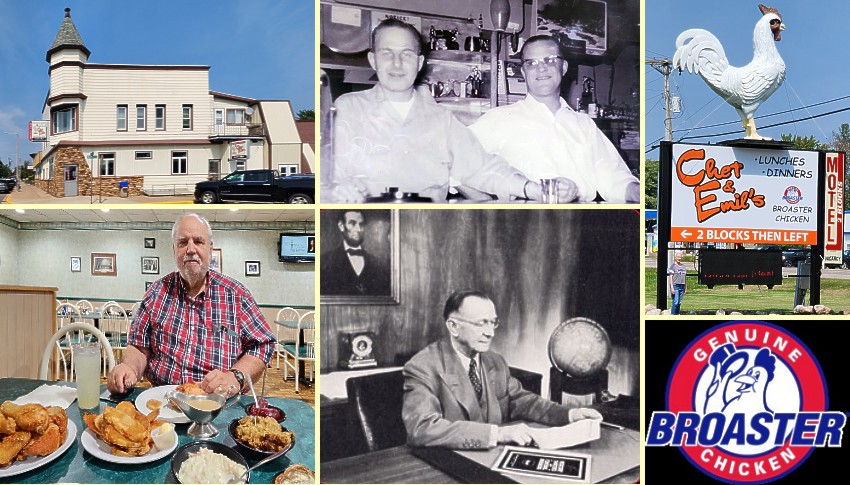Kansas Snapshots by Gloria Freeland - September 15, 2023
Curiosity - with a side of crispy chicken
Every part of the country has one or more foods the locals think of as commonplace, but are somewhat unique. When husband Art
arrived in Kansas, he had never heard of a bierock. That savory pocket sandwich found a home in the Sunflower State, courtesy
of the Volga Germans who arrived in large numbers late in the 19th century.
The tables were reversed when I visited Art's native Wisconsin. I kept seeing signs for "Broasted" chicken. What was that and where
did it come from? Was it made by combining roasting and broiling? Or perhaps it was just a Wisconsin expression, like the "soda"
we Kansans call "pop." Still, the name is a registered trademark, so there must be something more to it. All Art had to offer was
it was a variety of fried chicken - part of his childhood landscape, much like bratwurst and cheese.
Birnamwood has been a regular reminder that my Broaster questions had never been answered. Many of our trips to the Northwoods
included passing through the village of 730, an hour south of our cottage. The much-larger-than-life-size statue of a white
chicken advertising Chet & Emil's "genuine Broaster chicken" beckoned, but we never stopped.
It happened again this year, but unlike in the past, I vowed to get answers. I discovered that in 1953, Louis
Austin Merritt Phelan combined a pressure cooker with a deep fat fryer to create a Broaster. The goal had been a crispy exterior,
a juicy interior and coating flavors that penetrated the meat. The company was formed the next year - about the same time
Harland "Colonel" Sanders was developing his own pressure fryer for what would become his KFC restaurants.
The two companies used completely different business approaches. Sanders' chicken is available only at KFC-franchised locations.
In contrast, any restaurant or supper club - which are super popular in Wisconsin - can use the Broasted or Broaster trademark
if it uses the company's equipment and seasonings.
Since 1977, the Broaster Company has been headquartered in Beloit, Wisconsin. It makes the appliances, seasonings and marinades
to create its unique chicken and trains people from around the world how to use them. In 2018, there were more than 4,000
customers worldwide. The company's website says it has 60 full-time employees. Its largest unit can produce 22 pounds of chicken
- approximately seven birds - in around 10 minutes.
But engineer Phelan was no one-hit wonder. He was involved in a wide variety of endeavors. He invented Zesto Freeze machines
for making ice cream. According to Refrigeration Research, Inc., he worked with Goodyear, Monsanto and Allis Chalmers and was
even involved with the Panama Canal. In the 1910s, he, with friend and business partner Clifford Hotchkiss, developed mercury
switches that were used in home thermostats for years. Phelan was involved in the development of so many products, he could be
compared to Thomas Edison. But unlike Edison, he didn't put his name on them.
He also promoted music in the workplace to provide a more pleasant environment, and offered a plan for employee ownership of his
company.
All that researching had whetted my appetite - literally. While an hour drive for a meal is a bit much, it's completely reasonable
for data gathering. Art didn't need much convincing!
We went on a Sunday - late enough to avoid any after-church crowds. The building was much larger than what I had expected.
Our waitress asked if we wanted to see a menu or if we were going to have "the special" - plates and bowls heaped high with
Broasted chicken, potato wedges, rye bread, cranberry sauce, dressing, and cole slaw. Research dictated we'd have the special!
While waiting, I asked if there was a written history of the restaurant. Our waitress brought me "The Legacy of Chet & Emil's"
- a laminated sheet with information and photos.
The story began in January 1946, after friends and brothers-in-law Chester (Chet) Skodinski and Emil Praslowicz were discharged
from the service and purchased a building with a tavern. The upper floor became homes for Chet and wife Lillian and Emil and wife
Genevieve. Three generations of their families have now lived in those quarters.
In 1947, they added bowling lanes and a 50-foot bar. In 1950, a 60 x 90-foot dance floor was built that fit over the bowling
lanes to accommodate weddings, banquets, and community functions.
In 1963, they added the restaurant and purchased their first Broaster.
Our food arrived - and we weren't disappointed! The chicken was crispy on the outside and juicy on the inside, and the side dishes
were tasty. We both would have preferred mashed potatoes, but perhaps thatís because we're accustomed to Kansas chicken dinners
that include fluffy spuds.
When we finished, we were stuffed - and we had enough leftovers to make two more suppers. The bill? Less than $30 - not much more
than the price of two fast-food meals!
"The Legacy of Chet & Emil's" mentioned that Emil and Genevieve's son Douglas, his wife Barbara, and their friend Edwin Resch
purchased the business in 1981. Today, it is owned by Edwin Resch, Jeremy Praslowicz and April Resch. Judging by the number of
customers we saw, the business is prospering and Broasted chicken meals will be on the menu for Birnamwood area folks well into
the future.
It is said that curiosity killed the cat, yet in our case, it led to experiencing some unique cuisine, to say nothing of providing
great fodder for a column.
